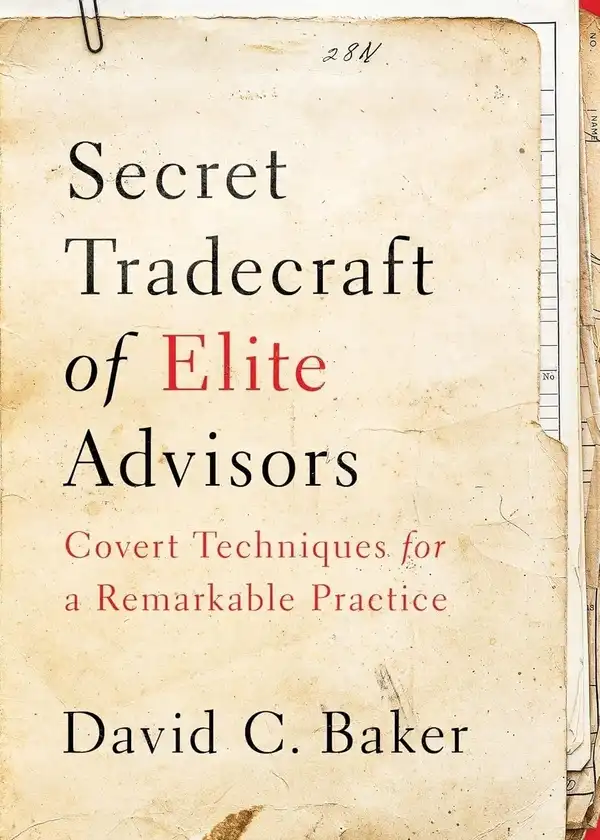←
Books

Secret Tradecraft of Elite Advisors
By David C. Baker, Emily Mills, and Bryn Mooth •
Revisited December 21, 2025 at 2:06 PM • Consulting

Table of contents
Nothing yet!
Links to
Nothing yet!
Nothing yet!
Linked from
Nothing yet!
Highlights
- What a life it is to get paid to think and talk and write. I hope you realize how fortunate you are.
- You must care a little less about winning the business than the prospect wants you to take him on as a client.
- If your “deliverable” reports are still as long as they were in the beginning, you’re either copying/pasting drivel or you’re wasting a lot of time hiding behind length instead of depth.
- You are selling objectivity, which comes from externality. One of the only reasons you can actually help them is that you are not in their world. They are inside their own jar and can’t read the label.
- First, it’s hard to be that present in a client relationship and retain your objectivity. The longer you are around, the more you are part of the problem and not the solution.
- Second, clients will not pay a premium for ongoing presence, long term. They will only pay a premium for episodic presence.
- The residents of a country welcome a liberating force more than the occupying force. When the former arrives, there’s cheering in the streets and gifts of food and adoration. When the latter stays, they take over the homes of the citizens, eat their crops, and get friendly with their daughters. Don’t be the occupying force.
- Your mental model must not depend on “accomplishing all the right things” but on “doing most of the right things,” regardless of the result. You will need to be okay with walking away, again and again, from unfinished business as clients make your advice their own, adapting it, bending it, interpreting it.
- If you care too much, you’ll lose some objectivity by getting a little too attached to the client.
- If you care too much, it will be difficult to create a consulting practice that is sustainable over many years.
- So if you figure out how much clients do care, then how do you use this information? One example is this: Don’t be any more willing to rearrange your schedule than they are willing to rearrange theirs. You must achieve and maintain the higher ground or you are no longer the expert and you’ll quickly feel disrespected and deflated. And rightly so.
- Why will your clients listen to you? Partly it’s because they’ve already paid you a significant sum and they don’t want to waste that! Partly because you’ve clearly demonstrated that you really do understand their world. And partly because they are stuck; they’ve tried but can’t seem to climb out of the hole they’ve fallen into.
- Numbers are what decision makers look at to overcome organizational inertia … and then use to defend their decision to others, especially when the result didn’t turn out as expected.
- There is no quicker way to learn the inside of a company than employee surveys. Whatever they are going to tell you in the survey is no different than what they have been saying to their peers and to the management team. The difference is that the management team hasn’t been listening.
- It’s fine to miss a few things. Your goal isn’t complete accuracy but directional and defensible accuracy.
- Skip the recitals about their situation. They know their situation, thank you very much, and it’s just killing trees to put all that nonsense in there.
- The most important strategy is to not define the scope so tightly that you have to follow it. You’d think that a tightly defined scope would protect you, but it actually obligates you to do a lot of specific things … plus all the other things that will crop up naturally as a relationship unfolds.
- But that’s not worthy of a good advisor, whose job it is to take a client where they are and move them as far as you are able without losing their enthusiasm.
- And when you’ve earned competence, the next phase allows you to cross over. Because you’re in a position of strength, of competence, you can leave behind some of your skills and learn new things. You don’t necessarily add more goals to your life; you decide which ones you’re going to drop and which ones you’ll add. Then you start seeing new patterns against the old ones.
- You’ll dive deep to make money and have impact, but you’ll think broadly to keep that sharp focus from getting untethered from reality. Your hobbies, your reading, your experiences—these will get more scattered while your work becomes like a laser beam.
- As your strengths deepen and creep, you may need a different audience if you want to remain relevant to anybody. Your audience will change organically, in good ways, and you will even lose part of your audience in that process. Just be sure it’s because they can’t keep up and not because they quit learning from you.
- Doing great work once means that you have just one more chance to do great work, again, and so the cycle repeats itself.
- If I could point to one thing that drags people away from long-term relevance, it is that they spend their best efforts on a single client instead of spending their best efforts on developing perspectives and processes for all of their clients.
- Don’t forget your health. Poor health can stop an otherwise relevant person dead in their tracks. Literally. Relevance is constrained by your physical limitations, and don’t ever take that for granted.
- There is confidence in remaining relevant for decades, but there is no arrogance.

Table of contents
Nothing yet!
Links to
Nothing yet!
Nothing yet!
Linked from
Nothing yet!